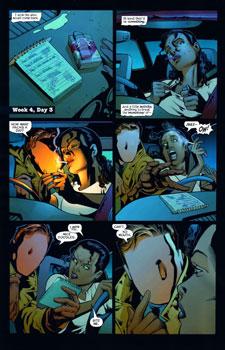“It’s just something I saw in the character from the start. She seemed to me queer and deeply in the closet,” says writer Greg Rucka of Renee Montoya. The character began as a supporting character on Batman: The Animated Series. From there, her popularity secured her a spot in the Batman mythos.
“I remember watching it,” muses Rucka. “Being so impressed when the show premiered and the first time the character showed up. I was like, ‘Holy crap! There’s a Latina in uniform!’”
Montoya has become the unsung champion of queers in mainstream comics, not shuffled to the sidelines, not reduced to T and A. Instead, Montoya has become a favourite character in several DC comics and was the launching pad for DC’s latest queer notable, Batwoman. More than any other, Montoya remains perhaps the most developed, most realistic queer character in any mainstream medium, including television and film.
That’s in no small part because of Rucka, who has written some of the best-developed queer characters in mainstream comics. Rucka was given a chance to build the character when he was offered a Batman story as a try-out before doing more within the DC Comics universe.
“As I was writing it, I sort of realized that there hadn’t been any established information about her family, so I sort of created that world,” he says. “This story sort of unfolded for me — that her parents were immigrants, that they were from the Dominican Republic, that they were religious. And somewhere in there, it was just clear that she was queer. I realized that everything that I had seen and everything I had read established that for the character. The thing that brings my hackles up is when people point fingers and say ‘You made this character gay.’ My feeling is, no, that was the character as the way I saw her.”
Rucka is aware that some Batman fans were surprised -— even put off — by Montoya’s character development.
“I’m never going to write something that everyone is going to like,” Rucka points out. “I’m not going to force anyone to read this stuff, but for the people who do seek out the work and do read it, I’ve got an obligation to tell them the best stories I can, as honestly as I can, and by that I mean as emotionally honestly in the context.”
“Renee Montoya was always an unusual supporting character because she is Latina,” points out author Andy Mangels. “But her heritage was only one aspect of her personality. When Greg Rucka and Ed Brubaker outed her [in Half-a-Life in Batman spin-off Gotham Central], it was fascinating not only in opening up more story possibilities, but also because it showed a greater amount of her personality.”
Montoya’s presence grew, and she appeared in several titles, including company spotlight event book Final Crisis. Rucka cemented her place in the DC universe when he used Montoya for the street level perspective of DC’s weekly comic experience, 52. He also gave Montoya an alter ego — repurposing the classic faceless super-sleuth the Question — in a move Rucka considers “a logical progression.”
“She surprises me,” muses Rucka. “I’ll be writing her and the second she puts that mask on, she gets funnier, and that surprised me. It just happened in the writing. You know, she starts saying stuff that makes me laugh.”
The new Batwoman, who shares a passionate history with Montoya, was also introduced in 52.
“They’re bad for each other, and they will be the first to admit it,” laughs Rucka. “They are the relationship where it’s fantastic when they’re together, but then they fight. They’re too much driven by passion when they’re together. That to me is a romance, and that’s not specific to any sexuality or sexual preference. I think that’s a universal experience.”
Montoya stars in a back-up strip to Batwoman’s feature in Detective Comics, which earned a 2010 GLAAD award. DC has announced that Montoya and Batwoman “will not be shelved,” but their future remains unclear with news that Rucka will be leaving DC to focus on his own projects.

 Why you can trust Xtra
Why you can trust Xtra


